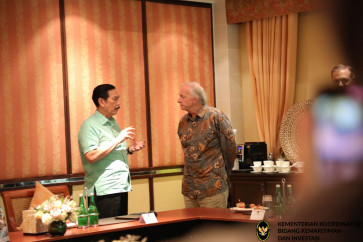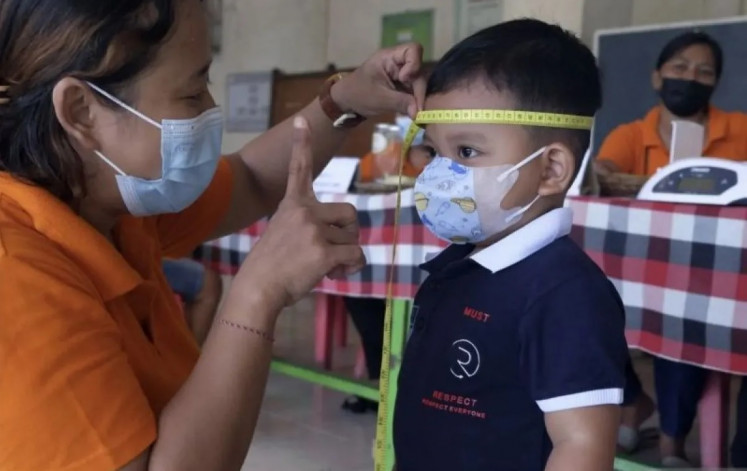Indonesian descendants in PH stateless no more
Filipina tour: Foreign Minister Retno LP Marsudi poses with Indonesian descendants at House of Indonesia in Davao, Philippines, on Wednesday
Change text size
Gift Premium Articles
to Anyone

F
span class="caption">Filipina tour: Foreign Minister Retno LP Marsudi poses with Indonesian descendants at House of Indonesia in Davao, Philippines, on Wednesday. The minister handed passports to 300 descendants living in the southern Philippines and launched the Philippines-Indonesia cooperation on Islamic education.(Courtesy of Foreign Ministry)
Long denied their basic rights because of a lack of proof of citizenship, undocumented Indonesians living in the southern Philippines started to receive passports allowing them to work legally.
Foreign Minister Retno LP Marsudi presented passports in Davao City to 300 people the ministry described as Persons of Indonesian Descent (PID) from eight provinces in southern Philippines.
“Presenting the passports is the most basic form of the state’s presence for Indonesians abroad,” she said in a media statement.
“A passport is a protection instrument that allows Indonesian diplomatic missions to provide services and protection.”
Retno said that the passports allowed the Indonesians to get residence permits to stay in the Philippines legally.
She said the permit could be extended every five years, a result of a meeting Retno had with Philippine President Rodrigo Duterte before she went to Davao.
Retno said stateless Indonesians had lived in the southern Philippines for decades.
On Mindanao Island alone, the ministry estimates the number reaches 12,000.
These PIDs could not apply for Philippine citizenship because of high application costs, rendering them stateless.
However, since 2011, the Indonesian and Philippine governments joined the United Nations High Commissioner for Refugees (UNHCR) in a global movement to end statelessness called #IBelong.
Based on the UNHCR’s research in 2015, there were 8,756 people of Indonesian descent in the Philippine who were stateless.
The stateless Indonesians had been facing difficulties getting access to their basic rights, such as for education and health.
Their legal status also hindered them from getting well-paid jobs that could lift them out of poverty, the UNHCR research said. Such poverty also prevented them from applying for Philippine citizenship.
According to a verification process conducted by the Indonesian government, only 2,435 were determined to be Indonesians and received citizenship confirmation letters issued by the Indonesian Law and Human Rights Ministry.
The rest were found to be either Filipinos or to be holding dual citizenship, as they are still under 18 years old, the ministry’s director for the protection of Indonesian citizens and legal entities abroad, Lalu Muhammad Iqbal, said in the statement.
“Wednesday’s passport presentation to the 300 people is an initial phase. We will reach out to the others to provide their passports,” he told The Jakarta Post in a WhatsApp message.
“The citizenship confirmation letter is our basis for issuing passports,” Iqbal continued. “However, our major challenge [to provide the passports] is to reach those on small islands.”
Nonetheless, he added, the ministry was optimistic that it would eventually reach all the listed Indonesian descendants within months.
Contacted separately, Adriana Elisabeth, an ASEAN expert from the Indonesian Institute of Sciences (LIPI), hailed the move granting passports to the undocumented Indonesian diaspora.
“This is a concrete attempt to provide certainty of their citizenship, as well as protection to them and both countries. However, it must be followed by a move to disseminate the people’s rights and obligation as Indonesians,” she told the Post over the phone.
She said that after decades living in the Philippines, the people of Indonesian descent might not be aware of what they should know about cross-border procedures and regulations in the two countries.
Hence, she suggested the government conduct a workshop or disseminate information on the issue.
Meanwhile, Retno also signed an agreement on Islamic education with Islamic schools in south Mindanao.
Among other things, Retno launched an annual, fully funded scholarship program for 100 students to further their studies in Indonesia.
The program was agreed to by President Joko “Jokowi” Widodo and his host Duterte during the ASEAN Summit.









